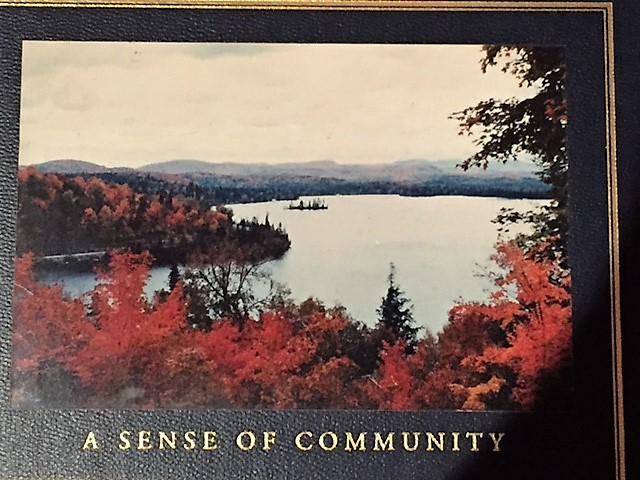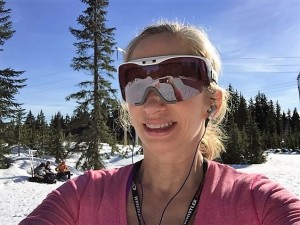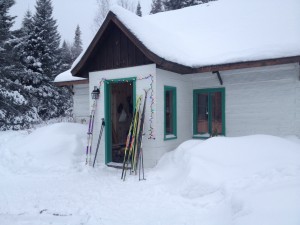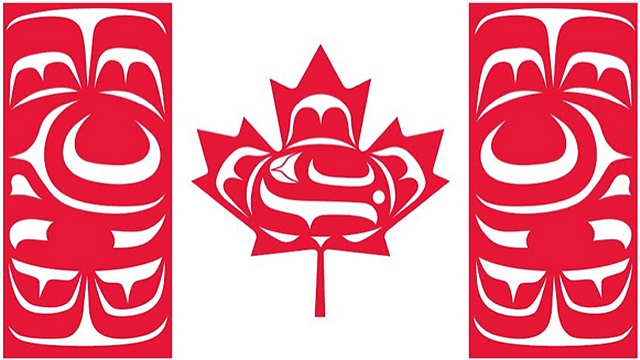
The cover from the community book for Lac Brule, Quebec, which documents the history of my husband’s family and those who settled (in their vacation homes) around the lake.
“Home may be in another time and place, and yet it holds us in its power here and now. Home is like our language, compelling us to think and feel in certain ways and giving us the freedom to imagine other ways and other places. It is who we are and where we belong. Home both binds us and liberates us” (Chamberlin 76).
My story of home begins with my parents’ homes. My father was born in Port Alice and grew up in Port Hardy where First Nations are 35% of the population in a home in the Kwakiutl traditional territory on the water. His parents fished for salmon alongside First Nations after coming from a farm in Idaho. My aunt married a mixed race First Nations man in the 1960’s when interracial marriage was not common. My father left school and went into the woods at age sixteen to work and then joined the Canadian Air Force to escape a difficult home. As a young girl visiting my grandparents I would see First Nations in hand carved canoes on the beach beside us. I loved the beach, with the strong tides, amazing sea life, the smell of the ocean, and the whales in the harbor. My mother considered Port Hardy remote and backward and our visits were fewer over time.
My mother grew up in Port Alberni next to the traditional territories of the Tseshaht and Hupacasath. Her parents had a more traditional European immigrant story. My grandfather was an impoverished Swede arriving on the boat from Finland in Canada to take free farm land to settle Canada. When Winnipeg proved too harsh he moved west and anglicized his name to avoid discrimination. My Swedish grandmother, an orphan at three, began work in a fancy house in Shaughnessy as a downstairs maid, having little English. She and her twin sister saved everything they made to eventually buy a rooming house and a bakery. When my grandfather and grandmother married, he left for the woods to log while she managed the farm and family restaurant. Canada provided middle class prosperity and safety from the second world war in Europe that killed most of their siblings. My grandmother remarried just before I was born when the hard labour of the woods killed my grandfather at age fifty and she moved to Nanaimo, traditional territory of the Snuneymuxw. I loved the farm in Nanaimo on the river, where I learned to swim, and loved the fields, the woods, and the clear fresh water. We had idyllic visits harvesting the fruit and vegetables and consuming my grandmother’s fresh baking under the warm sunny skies.
My family lived all over Canada, so my grandmother’s farm was my real home. While we moved to dreary houses in different provinces, I could still return there to the thread of my life. My parents had set out from Vancouver Island to explore Canada when still in their teens and were looking for the perfect small town together. The Canadian Air Force took our family to Biloxi, Mississippi in 1964 where we witnessed first-hand the “beach wade-ins” to protest school racial segregation. After my father left the Canadian Air Force he worked for the “telephone companies” building the infrastructure for modern communication for Canada. My home was Prince George, Cape Breton, small town Ontario, and finally Richmond…. The houses and the towns were transitory, but home was going back to the farm in Nanaimo and the beach in Port Hardy. The story of my grandparents’ home kept us “sane and steady” (Chamberlin, 78) from our unhappier story – one of parents who had married far too young in order to escape their small towns and never found that perfect small town together.
My mother was very proud of our working class roots. We were descendants of workers who had created new lives with sweat and determination. My desire to go to university (the first to earn a degree in my family) and study language, literature, and liberal ideas was to reject the values of my home. Now I have lived in West Vancouver for twenty years with my husband and children and really don’t feel a sense of home in Richmond. When my mother passed away, we sold the Richmond family home of thirty-five years and it was knocked down for redevelopment within weeks. Like my ancestors, I am continuing the re-creation of home for what suits my family and my life style. I can look out my kitchen window at U.B.C. and be up Cypress Mountain to cross country ski within fifteen minutes.  I love where we live, but now we have too big of a house for my husband and I, so we will likely move when my youngest daughter goes to university in 2017. My daughters, like most of their friends, feel a need to go away, and find their own home and experience. Cypress Mountain cross country skiing 2016.
I love where we live, but now we have too big of a house for my husband and I, so we will likely move when my youngest daughter goes to university in 2017. My daughters, like most of their friends, feel a need to go away, and find their own home and experience. Cypress Mountain cross country skiing 2016.
By contrast, my husband has a great sense of history in his family. They were originally from Scotland and have been in Quebec for many generations. Their story is more typical of British immigrants. They were successful professional people with education and summer homes. In the 19th century they had architects build wonderful summer homes and ski chalets with tennis courts on Lac Brule in the Laurentian mountains. “Many well-off city men buy themselves farms at a certain stage of their careers… its understood they can now afford to indulge: a hankering to make contact with the land” (Gordimer 22). There are stories of a leisure class taking horse drawn carriages from the train station to reconnect with the earth with wonderful gardens, tennis, and canoeing. This land that my husband’s family made contact with has now replaced my grandmother’s farm as my home base. We go every summer for the community regatta and every winter for the cross country ski loppet around the lake.  My daughters love our little cottage and speak of bringing their children there – it is understood that this is where our family history will continue. They love the sense that their ancestors were there, that everyone returns from all over Canada and the U.S. for these bi-annual events, that there are books written about the community. There is a sense of land, with raspberry patches and wild blueberries. There are wide open fields for children to run free and a clear, clean lake for swimming, canoeing, and skating.
My daughters love our little cottage and speak of bringing their children there – it is understood that this is where our family history will continue. They love the sense that their ancestors were there, that everyone returns from all over Canada and the U.S. for these bi-annual events, that there are books written about the community. There is a sense of land, with raspberry patches and wild blueberries. There are wide open fields for children to run free and a clear, clean lake for swimming, canoeing, and skating.
Did we take this home from someone else? There is no sign of indigenous history there although research tells me there obviously is some. The Quebec heritage web site talks of a land largely uninhabited when settlers arrived. This is the narrative of the colonizer – of an empty Canada, ready for settling, mapping and (re)naming. The indigenous peoples, the Weskarinis-Algonkians, wintered in our area for centuries before their defeat at the hands of the Iroquois in 1651. Then the francophone settlers came to farm the land to be replaced by the Montreal leisure class because of its beauty and proximity to the city. Today the lake is still almost exclusively owned by Anglophones. There is still an awkward sense of segregation as shop people and snow plow drivers are Francophones and part-time resident landowners are Anglophones. My husband grew up in Anglophone Westmount during great political tension and left this idyllic home for the west coast as he graduated when Anglophones were limited professionally in Quebec.
So, I have this home in Vancouver that I love, but will leave, and my adopted home in Quebec that I hope to see my grandchildren inherit one day…. And, I travel a lot. I explore the world to learn about people and places. My family had an amazing trip to an indigenous community in a remote part of the Amazon after a long canoe ride past the foreign owned, smoking oil wells. We saw the homeless indigenous on the streets of Quito. I was in the theatre district in London during the Thatcher poll tax riots and in Paris during May Day protests with police in riot gear. For work, I have seen the optimism in Bangalore and the pessimism in St. Petersburg, Russia where my Russian hosts told me that Stalin was the greatest Russian leader of modern times. I left Manhattan early on September 12, 2001 after seeing the city attacked just blocks away from my investment banking meetings. I worked for B.C. Transmission Co. as they attempted to negotiate to develop transmission lines through First Nations traditional territory and participated in supporting the 2010 Olympics, where four First Nations welcomed the world to their traditional territory for the games. When I arrive at the airport home to Vancouver I am a little uncomfortable about the brand new highly varnished totem poles on display commissioned to attract tourists with the cultural richness of the spectacular land that we have colonized and settled. When I leave the airport and walk outside I breath in the cool, damp, clean air and it smells like home.
That is the story of my home. Although it is the story of an immigrant, of continually recreating the home story, it is a good home.
I do not have songs that remind me of home, or a home that is rich in music. Is music an important part of home for you?
Works cited:
“1990: Violence flares in poll tax demonstration.” BBC News – 1950 to 2005. 31 March 1990. Web 8 February 2016.
Chamberlin, Edward. If This is Your Land, Where are Your Stories? Finding Common Ground. Toronto: AA. Knopf, 2003. Print.
“FLQ Crisis.” The Canadian Soldier in the 20th Century. Web. 8 February 2016.
Gordimer, Nadine. The Conservationist. Markham: Penguin Books Canada Ltd, 1975. Print.
Matas, Robert. “Olympics were sweet and sour dish for first nations.” The Globe and Mail. 11 February 2011. Web. 8 February 2016.
Pollock, Diane and Moffat, Margaret. A Sense of Community. Ste. Agathe North: DiMar Publishing, 2001.
Stock, Sandra. “The Laurentians: A Very Concise History, Part 1.” Laurentian Heritage Web Magazine. Sherbrooke: Quebec Heritage Web, 2014. Web. 8 February 2016.

4 responses to “Assignment 2.2: The Story Of (a Good) Home – Andrea Davis (Johnston)”